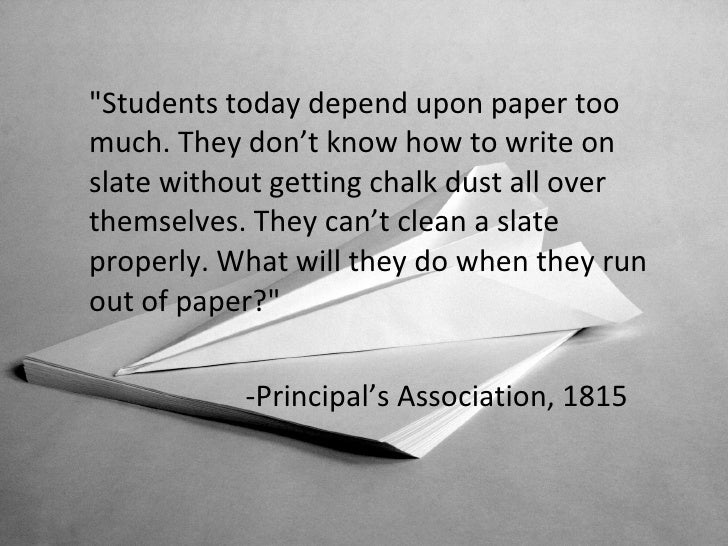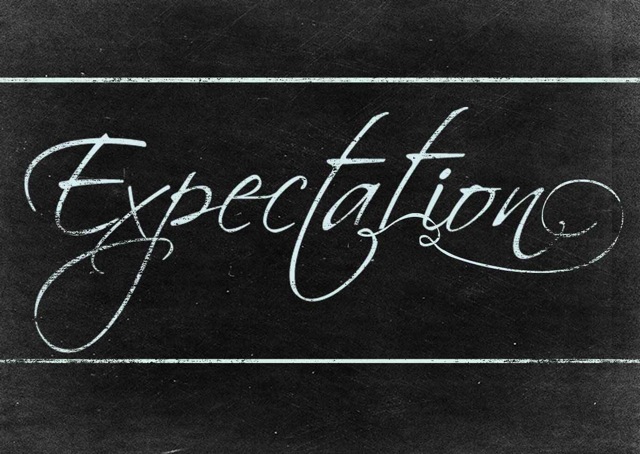Technology often gets a bad rap in education circles. Perception and lack of information influence the decision making process. I just heard a teacher say at an inservice recently, "I dont have time to learn technology. Kids don't need it anyway." I had to confront that teacher. Not only is technology a required piece of the CCSS, but c'mon... We ofen see this misinformation resulting in the formation of rules and policies that restrict or prohibit student use of technology as a tool to support and enhance learning. Even with the proliferation of technology across all facets of society, we still see schools moving at a snail’s pace (if at all) to adapt, or better yet evolve, to a digital world. We have to inform our policy makers and our teachers. E. Sheninger writes, "From this ignorance a plethora of excuses arise. Educators and administrators are quick to point to technology as the main culprit for an array of issues."
Leading ed tech scholar Eric Sheninger goes on to point out, "Case in point. Over the summer I was working with a couple hundred school leaders on digital leadership. As the presentation began to focus on mobile learning initiatives a hand immediately went up. In a polite tone the school leader expressed his apprehension with allowing students to bring or use their own devices in school. His main fear was a concern that students would be constantly off task texting or checking their social media accounts. I paused for a moment to decide on an appropriate response. Herein lies some irony. For the majority of my presentation this school leader had been disengaged himself with his technology. As the majority of the group intently listed or participated in planned activities to apply what had been learned this individual and his buddies checked their email, surfed the web, and accessed their own social media sites.
The off-task behavior in the example above was glaring. I seized the opportunity to not only call the group out tactfully and with respect, but to also hammer home a few points. Adults can be just as bad, if not worse, than our students when it comes to technology. How can we as adults set expectations for device use for kids if we ourselves are not willing to abide by those same expectations? This is quite hypocritical don’t you think? Change in mindset hinges on our ability to challenge certain assumptions that we have in terms of mobile technologies. When we do, the end result is that every one of us has been guilty of the same types of behaviors that students are chastised for.
Stay with me on this as we take a walk down memory lane. I want you to think back to your days as a student before the proliferation of mobile technology. Through a series of questions I am going to not only ask you to reflect on what you did, but also in the process challenge some firmly entrenched assumptions regarding technology. Here we go!
The process of effectively integrating devices begins with our ability to model appropriate use while reinforcing student expectations for the role of mobile devices. Make sure the essential elements are in place to ensure that devices afford students the opportunity to:
Image credit: http://image.slidesharecdn.com/
The off-task behavior in the example above was glaring. I seized the opportunity to not only call the group out tactfully and with respect, but to also hammer home a few points. Adults can be just as bad, if not worse, than our students when it comes to technology. How can we as adults set expectations for device use for kids if we ourselves are not willing to abide by those same expectations? This is quite hypocritical don’t you think? Change in mindset hinges on our ability to challenge certain assumptions that we have in terms of mobile technologies. When we do, the end result is that every one of us has been guilty of the same types of behaviors that students are chastised for.
Stay with me on this as we take a walk down memory lane. I want you to think back to your days as a student before the proliferation of mobile technology. Through a series of questions I am going to not only ask you to reflect on what you did, but also in the process challenge some firmly entrenched assumptions regarding technology. Here we go!
- Did you ever write a note and pass it? Today’s students text or communicate via social media.
- Were you ever so bored in class that you doodled or daydreamed? Well, now kids check their social media accounts or use apps to engage themselves.
- Did any of you ever see someone with a cheat sheet or answers written on their hand? Now I know as educators you never did this, but I think you get my point. Obviously kids can use technology to do this now as well.
- Did you ever break any school rules that you didn't agree with? Students do this all the time when dictator-like policies and rules govern technology use.
The process of effectively integrating devices begins with our ability to model appropriate use while reinforcing student expectations for the role of mobile devices. Make sure the essential elements are in place to ensure that devices afford students the opportunity to:
- Support and/or enhance their learning
- Conduct better research
- Improve personal productivity
- Develop and model digital responsibility and citizenship
- Acquire and apply critical digital literacies
It is time to not only perform the job that we signed up for, educating kids, but also do so in a way that prepares them to harness the learning power of mobile technologies. Excuses plague education systems around the world. Stop making it about the adults and focus on what’s best for learners today. "
Eric Sheninger's blog post is clearly on the cutting edge, but I hope that it rings home with you.
Articles you may enjoy:
Phonics Strategies for Young Learners Using the iPad
E-RATE Resources
All kids deserve the best
Obama pushes for limits on testing
E-RATE Resources
All kids deserve the best
Obama pushes for limits on testing
@
Videos to Check out:
original video produced by Best Reviews and posted at : http://bestreviews.com/#reviews
Evolution of the Desk (1 min)
\
Calendar of Events:
K Assessment collection window closes--Oct 30
DTC Training online from ODE--Nov 3-5Teach Like a Pirate--Nov 13
E-RATE TRAINING @ Harney ESD--Nov 20 9AM-4pm
Writing Scoring--Dec 11
Teacher Voice Workshop--Jan. 8
Deadline to distribute Report Cards to Parents--Jan 15
Teacher Voice Workshop--Feb 12
Math Talk Workshop--April 15-16
Katrina Ayres--Classroom Practices--May 6


